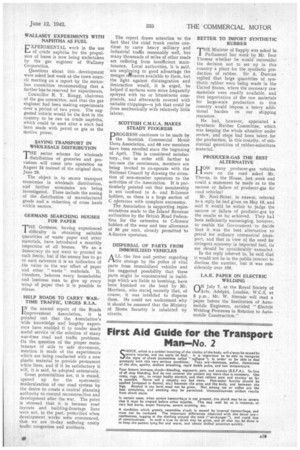First Aid Guide for the Transport Man—No. 2
Page 21

If you've noticed an error in this article please click here to report it so we can fix it.
SHOCK, which is a sudden lowering of the vitality of the body, will always be caused by
severe injuries, and can easily be fatal. It is Important to be able to recognise the signs of shock (sometimes called ', collapse"), in order to be able to deal promptly with this very serious condition. They are—faintness, pallor, clamminess of the skin, apathy, shallow breathing, rapid feeble pulse, and low temperature.
Four factors increase shock—bleeding, exposure, pain, and anxiety (B.E.F.A.). So first of all stop bleeding, and do not uncover the patient any more than is necessary. Use coats, rugs, etc., to retain bodily warmth, and then relieve pain and anxiety so far as possible. Never tell a casualty any bad news. Hot-water bottles should be applied (wrapped in flannel, etc.) between the arms and the body, and between the legs. Alcohol In any form must not be given. Hot strong tea or coffee are the best stimulants, and smoking may be permitted. Unconsciousness seldom results from shock alone.
In certain cases, when severe hamorrhae is not present, the shock may be no severe that it must be treated before other injuries. This may well be so 1 n instance: of very bad burns, major fractures, severe crushing, etc.
A condition which greatly resembles shock is caused by internal hmmorrhage, and must not be confused. The Important differences observed with the latter are— restlessness, tugging at the clothing around the neck ("air-hunger"), and rapid loss of consciousness. In such a czse no drink may be given, and all that can be done is to keep the patient lying flat and warm, and obtain skilled attention quickly.




















































